These five Bangalore women are changing the way children learn by adding unique elements that foster overall growth and understanding.
Jyotsana Mandana, Co-Founder, Promise Centre
Coming from a family of educationists, Jyotsna has education in her genes. Her grandmother and mother are both teachers and having studied child psychology she worked in different schools before joining Promise Centre. Started by her mother in 1990, Promise Centre is a 26 year old kindergarten community that adopted the Waldorf system in 2005. This system essentially focuses on the concept that true developmental learning needs of the child should be sensorial, experiential and joyful especially in the formative years between 0-7 years. “Parents of the children of our school are always asked ‘where does your child school as your child is so confident, spontaneous, creative and sensible’ and that makes us very proud,” says Jyotsna who admits that she loves working with children. She believes that learning can happen more easily when children are engaged with their heart and hands than direct instructions that address only the head. The school does a set of activities that focuses on the concept that true learning happens with joy. “We focus on giving physical experiences that are tangible, rather than mechanical mentally stimulating activity that has no purpose for the child whatsoever.” For example if children are asked to lay out mats for eating, then they will know how to count say 20 mats by laying them in the designated places. At lunch they learn to serve others, wait their turn, thank those who prepared the meal and clean up together, all much needed social skills in this day and age. Likewise the school involves them in activities like composting in the fall season, where they collect the dry leaves and pour the cow dung over it and understand the process from start to finish Jyotsana adds, “I would like parents to be inspired by us and start Waldrof Grade schools. A couple of these have already been started like the Bangalore Steiner School and Advaya Shaale and I hope we have more soon.”
Philosophy: The school strives to retain the spirit of the wonder of childhood through the ideals of Rudolph Steiner which is to allow the child to grow in freedom with the necessary boundaries, while spontaneously imitating, purposeful work done by the adult in the environment. The school community does not encourage TV watching or eating junk food either.
Classes: Promise Centre has children of a mixed age group from 2.10 years to 6 years in one environment and no separate sections as such. Children are given chores according to their age and challenge levels.
Fun Stuff: Children engage in meaningful day to day activities as well as activities of the season or festival that they see around them. It is untrue that children need constant stimulation as they can become very agitated with frequent change. We follow one rhythm for the whole month. For example in the mango rhythm children will learn how to make aam panna, raw mango salad, make a toran with mango leaves and use the sticks as tooth brush. There will be a mix of activities like cooking, printing, singing songs related to the mango in different languages. Children also do fleece work and candle making during Christmas.
Differentiator: Children do not read and write till they lose their first tooth usually at 6 years of age which is one of the many indicators of school readiness.
Shukla Bose, Founder And CEO, The Parikrma Humanity Foundation
Parikrma Humanity Foundation was started as an NGO 15 years ago by Shukla who gave up a high flying corporate career as she was “anguished with social injustice that exists and the huge divide between the rich and poor.” As a student she had volunteered with Mother Teresa and worked at the grass root level for 7 years. “I therefore was exposed to the depths of despair that extreme poverty can lead to. I was convinced that it is only education that can break any cycle of poverty. I also knew that it is not just going to school that the poor children needed but a comprehensive development program with high quality education. I therefore decided to quit corporate life and get into social work and transfer some of my experience and learning into this sector.” Parikrma runs 4 schools and a college for 2000 children from the streets, slums and orphanages in Bangalore. “We are working with about 15,000 people from 99 slums and 5 orphanages. Our parents are daily wage labour with an average income of about Rs 4500 per month with 5 people to feed. 98% of our fathers are alcoholics and 92% of our children have someone in their family in jail. Our parents have never been to school themselves and sending their children to school is very low in their list of priorities. In the city of Bangalore, which is the IT capital of India, there are 850 slums and about 2.5 million live in abject poverty. It is estimated that there are more than 14,000 children out of school in Bangalore. I realised that this situation would only worsen if something different and innovative were not done to educate the poor.”
Philosophy: Parikrma strongly believes in equality and quality, collaboration and inclusiveness, humility and compassion. These beliefs have permeated in our Education Philosophy which has the six Es’ for instance Expose, Experience, Express, Empower, Enquire, Empathise. The school has created an environment where the students can question and express views without the fear of being judged.
Classes: The schools have classes of UKG to Grade 10 and then the college caters to Grade 11 and 12.
Fun Stuff: Every day in school is fun because we have very carefully embedded the fun element in our processes and systems, and today it has become our way of life which we call the Parikrma Way. Each classroom wall is a canvas that allows student’s expression and showcases their talent. They have a very interesting period every morning called USSR (Uninterrupted, sustained and silent reading) when the whole school shuts down for 40 minutes to read. Even the security guard, other staff, students and teachers read quietly any book of their choice.
Differentiator: The school offer a development program for the poor and children are not just regular students, but are change agents that will transform the slums they come from. And because they have this responsibility, the curriculum and pedagogy has been designed to make that possible. “We have moved away from the traditional textbook learning based on memory. In our effort to encourage creativity and critical thinking we have created themes and concepts that the children learn together with their peers independently,” avers Bose.
Jayashree Janardhan Ashok, Co-Founder, The Creative School
While working in the US in enviable positions in software majors, Jayashree realised that while she was doing exceedingly well at her job, she was still finding it hard to handle stress and balance work and life. “I started Creative deeply inspired to create a space where children’s inner growth is emphasised as much as joyful academics and the quest for learning and as a space that will help retain a child’s spirit and build inner strength and emotional intelligence. I was very inspired by Sri Aurobindo and The Mother’s writings on Integral Education. Creative has been the culmination of 15 years of research on different types of schools,” says Jayashree. The school is futuristic in the sense that it uses environmentally sensitive materials and children learn to care for nature as well. “Children lean towards a specific area and we try to point this to their parents so that the children can flower. However when the children are in 10th and 12th grade, they are kind of steam rolled into conforming to outer requirements and this is where we think children lose their self confidence. When the child is able to follow their passion, they are able to do better in academics. We also build in emotional intelligence at an age appropriate level. We show children how to face and overcome difficulties which is an essential life skill.”
Philosophy: Every child has an inner calling which needs to be recognised and allowed to blossom. Children’s spirit and capacity must be encouraged so they become conscious creators of their lives and this school strives to find that potential in every child.
Classes: The school is a recognized fully from Nursery through Primary school. They offer education enrichment and many activities for home schooled children in higher grades. They are in the process of complete registration all the way through high school.
Fun Stuff: The entire curriculum is a joyful exploration. Children follow many of their passions and the school offers a wide range of subjects academic and non-academic. Some really fun areas for children are Play Healing and Imaginarium, Consciousness Lab, Theatre, Clay and Arts, Movement and Dance, Music (wide range), Wide variety of sports and free play, Co-operative Games and most of all a healthy environment where they receive a lot of nurturing support to build their confidence. Field trips and community activities also help children learn the art of getting along with important life skills.
Differentiator: A child’s self esteem and interests are respected and honoured in the school as children are treated with respect and their individuality is treasured while at the same time they learn to co-operate with each other. “Sometimes we have had children join who were considered trouble makers and who blossom and become truly wonderful in this environment where they are respected. We watch the children learn to hold their heads high naturally as their inner strength grows and builds. When their inner confidence is intact they can adapt to anything and learn to make wise choices for themselves.”
Tristha Ramamurthy, Founder & Executive Director, Ekya Schools
The first institution under Ekya Schools was launched in 2010. Ekya was founded to provide progressive, immersive learning experiences to families that value holistic development. “We wanted to cater to parents that understand the important of learning and understanding rather than just scoring marks. Our kids are welcomed into their class with a handshake or a high-five by their class teacher. We believe that it helps us gauge how every student is feeling and helps start the day off positively. Every class (and staffroom) has an affirmation board where the school community can post praise or appreciation for another person. This helps the Ekya community grow stronger bonds and focus on the positive side of things,” says Tristha.
Philosophy: Ekya strongly believes that their purpose is to empower students to make a difference in the world, now and in the future and nurture ten key habits in the students. The five habits of the mind they foster are – to think creatively, reason critically, communicate effectively, collaborate productively and learn continuously. The five habits of the heart they encourage are the values of respect, grit, service, integrity and empathy.
Classes: The school currently has four students from the age of 2.5 to 18 years, enrolled in Montessori, Kindergarten, Grade 1-12 program and offer ICSE, CBSE and IGCSE courses.
Fun Stuff: Every grade is deliberately designed to be fun and exciting. The pre-primary students have a very successful inquiry-based program called “Quest” where they explore an interesting topic for 4-6 weeks alongside other curriculum. They cover units ranging from study about bees, food, community helpers, the moon, our city Bangalore and so on. Units are further reinforced through Visual art and Performing Arts. For primary and middle schoolers, an annual Design Thinking Challenge is led by facilitators. Children are taught how to research, ideate, interview, gather data, rapid prototype and to give and receive feedback. Through the process they develop products or systems to solve a real-world problem. “Senior school students run many clubs, but being in Bangalore, our tech clubs are really unique. Our students love building apps, participating in hackathons, working on their Raspberry Pi and Audrino kits. We have a Makerspace on campus that allows for further cross-curricular projects,”
Differentiator: Ekya believes that learning does not happen by default, but by design. Therefore, they carefully plan and implement their in-house curriculum. “We do not believe in rote learning, we do not encourage question-answer format to a lesson and we do not use textbooks. We use technology intelligently to serve the purpose and have been using Google Suite for collaboration for the past four years. Our curriculum is informed by standards, internationally benchmarked, it is learner-centric and evidence-based.The way we design our curriculum, our unique instructional methodology, our assessment pattern, our award-winning campuses, our passionate teachers and our school culture – in combination makes us very different from conventional schools,” says Tristha.
Bindu Subramaniam, Dean, SaPa (Subramaniam Academy of Performing Arts)
Subramaniam Academy of Performing Arts (SaPa) was started in 2007 by Dr. L. Subramaniam and Kavita Krishnamurti Subramaniam to create a home for global music in India. SaPa’s aim is twofold – to help talented children build a career in music and work to integrate music into mainstream academia. Bindu and her brother (Ambi Subramaniam) have been running the school since 2011. SaPa has also created suitable lessons for different levels of learning. Whether it is rhythm sessions, activities, or workshops by international musicians, there’s something for everyone. When children are comfortable with music and build a strong foundation, they can create anything.
Philosophy: The idea behind SaPa is to promote non-competitive excellence and create a home for global music in India. “This philosophy drives our various initiatives; last year, we started The SaPa Show (aired weekly on Sri Sankara TV) to train children to develop their musical skills for the long haul. We also collaborate with international cultural institutes and invite artists from all over the world to teach children different aspects of music and build a community by expanding the students’ horizons,” says Bindu.
Classes: SaPa trains children from ages three and up.
Fun Stuff: Since their youngest students are toddlers, they ensure that the learning environment is conducive to children. “We have specially designed baby rooms with murals of Baby Thyagaraja, Baby Dikshitar, Baby Purandara Dasa and Baby Shyama Shastri – to engage the children’s attention. We also ensure that the kids have fun while learning in a variety of ways – for instance, by incorporating the tanpura inside a stuffed toy. We also invite educators and musicians from across the world to work with the children,” says Bindu. Last year, they collaborated with HeyMath!, a Chennai-based Institute to bring maths and music together. The workshop leaders, two mathematicians from the University of Cambridge, worked with children between 5 and 15 years old and taught them different math and music concept through games. “For instance, they marked notes on a scale in ascending order and asked them to play or sing going up the scale and skip certain multiples. This was to get them to visualize number patterns. Through this workshop and many others, we have used activities to reinforce musical concepts,” adds Bindu.
Differentiator: SaPa uses a lot of unconventional teaching methodologies. The focus in on fun through learning and at the same time ensures that children have a very strong foundation. The school place equal emphasis on Indian and global music since it is important for students to gain mastery over both forms. “We also ensure that we create a relaxed atmosphere and let the students know that music brings in more colour into their lives. One way to create this atmosphere is by letting them take in the classes at their own pace instead of forcing music on them. They can meddle with the musical instruments, and strum or feel the strings as they wish. We encourage them to stay curious and ask as many questions as they’d like,” says Bindu.
This story appeared as the cover story in Femina Karnataka twin issue dated June 1, 2017 here:
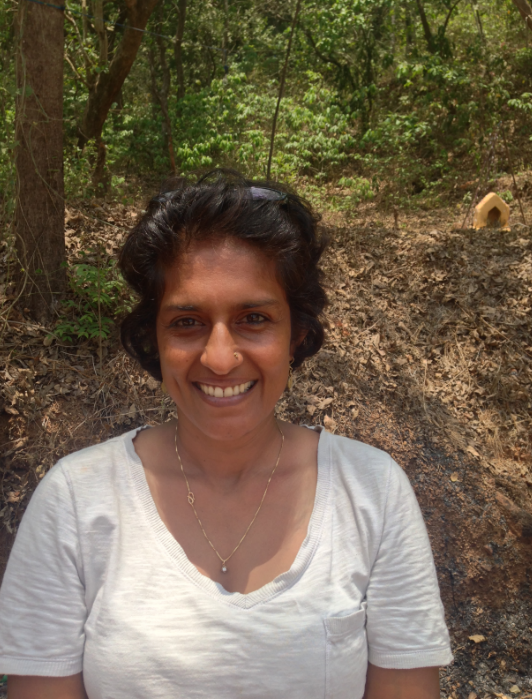
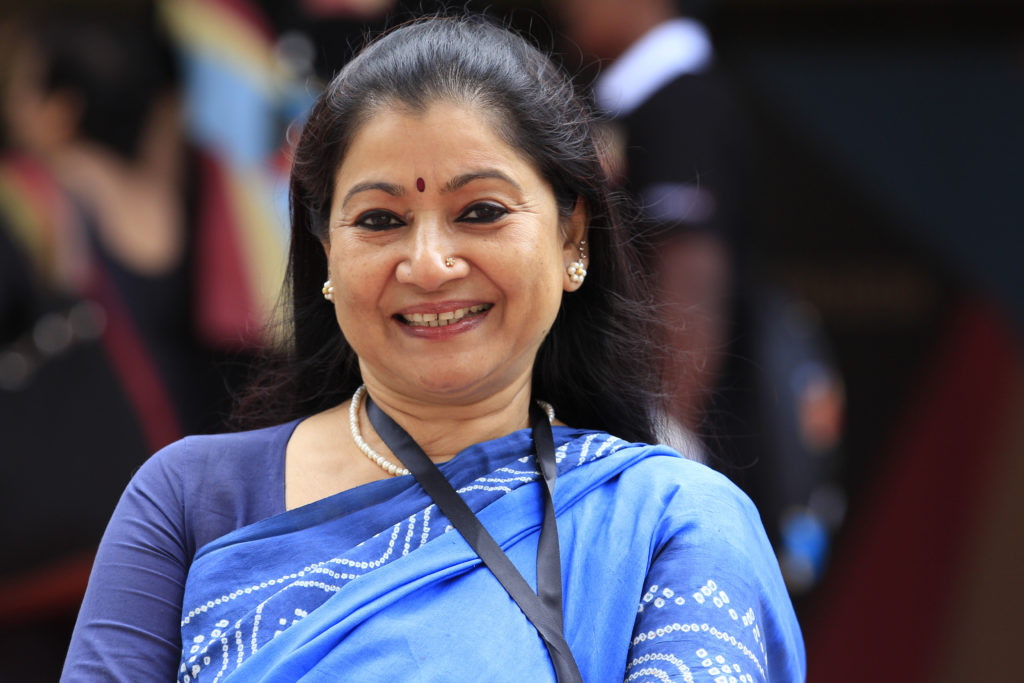
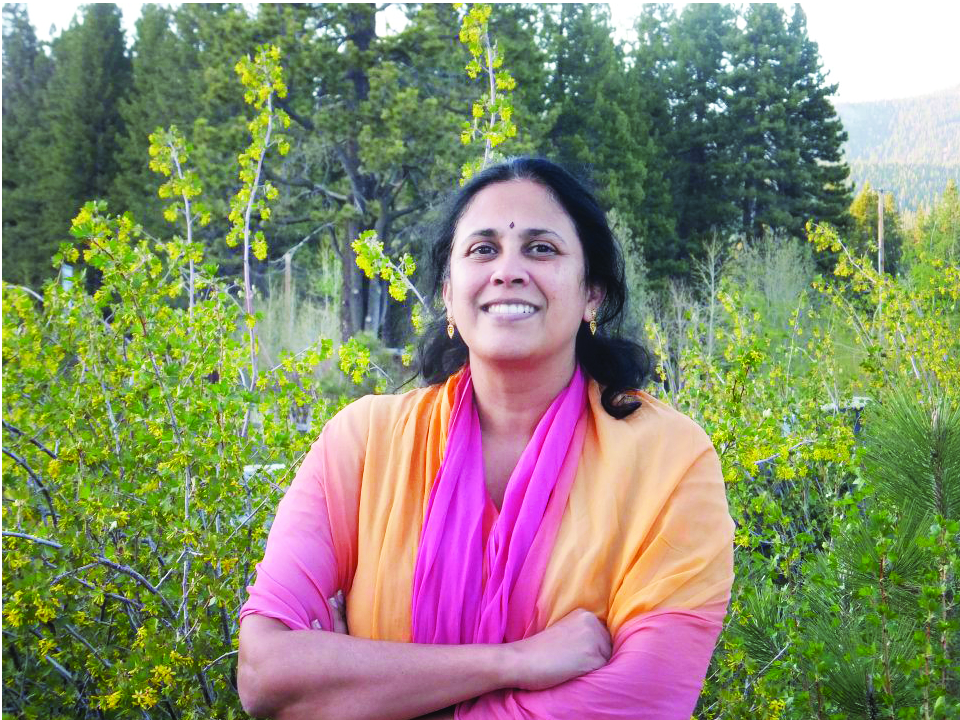
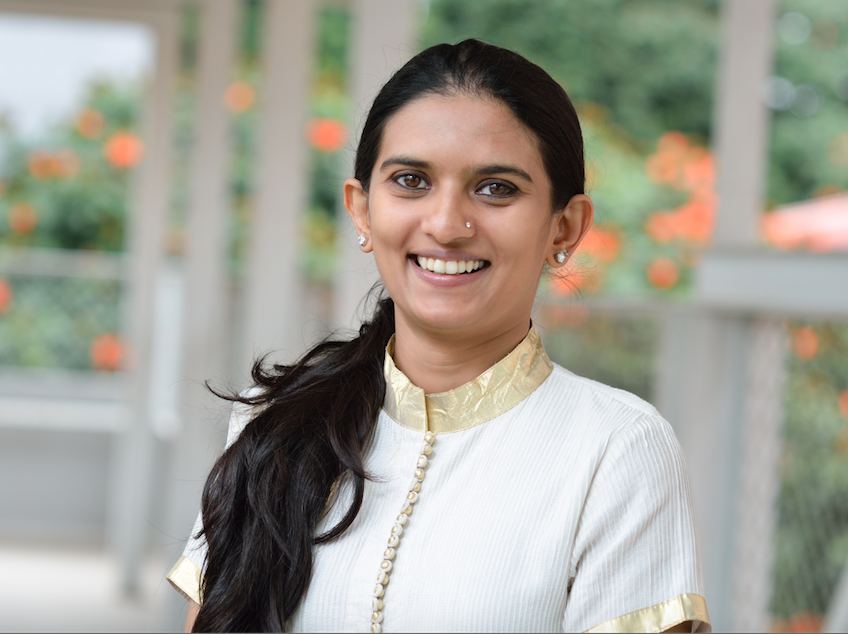
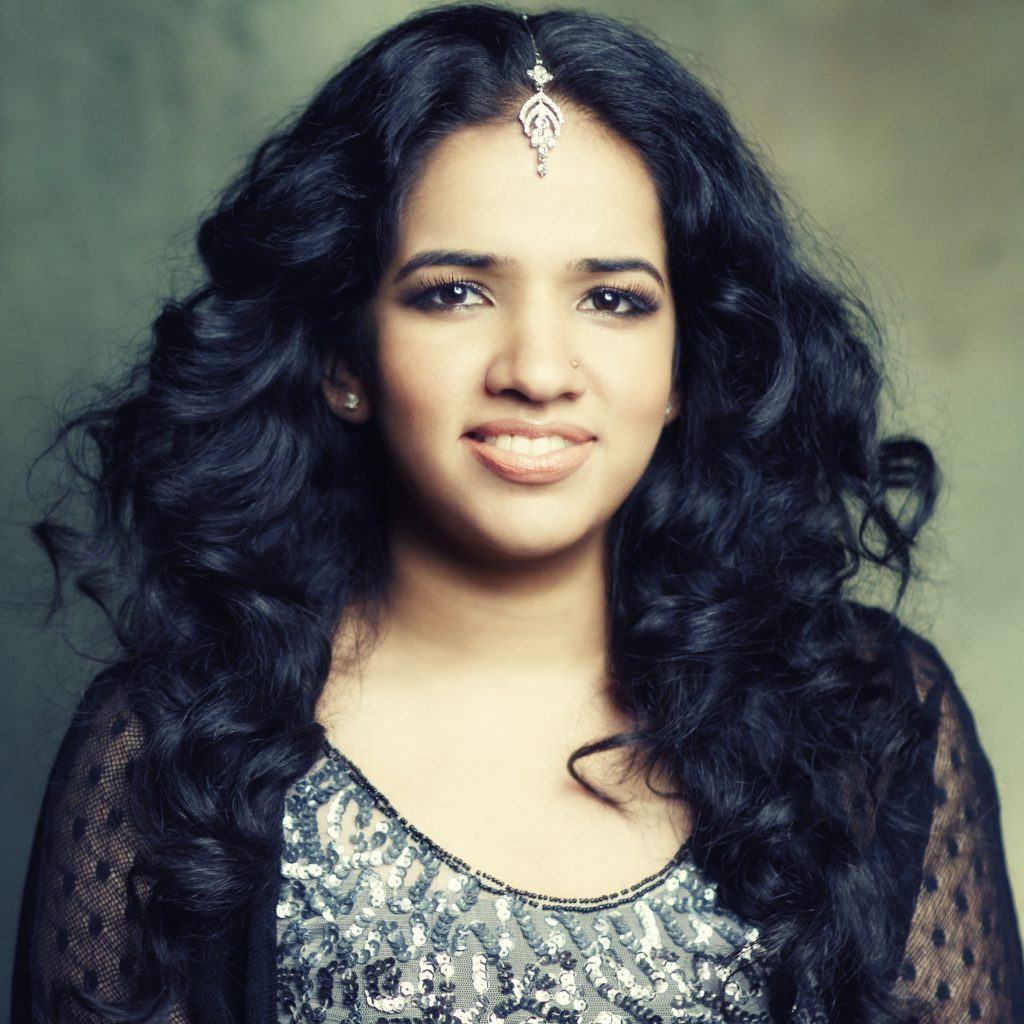
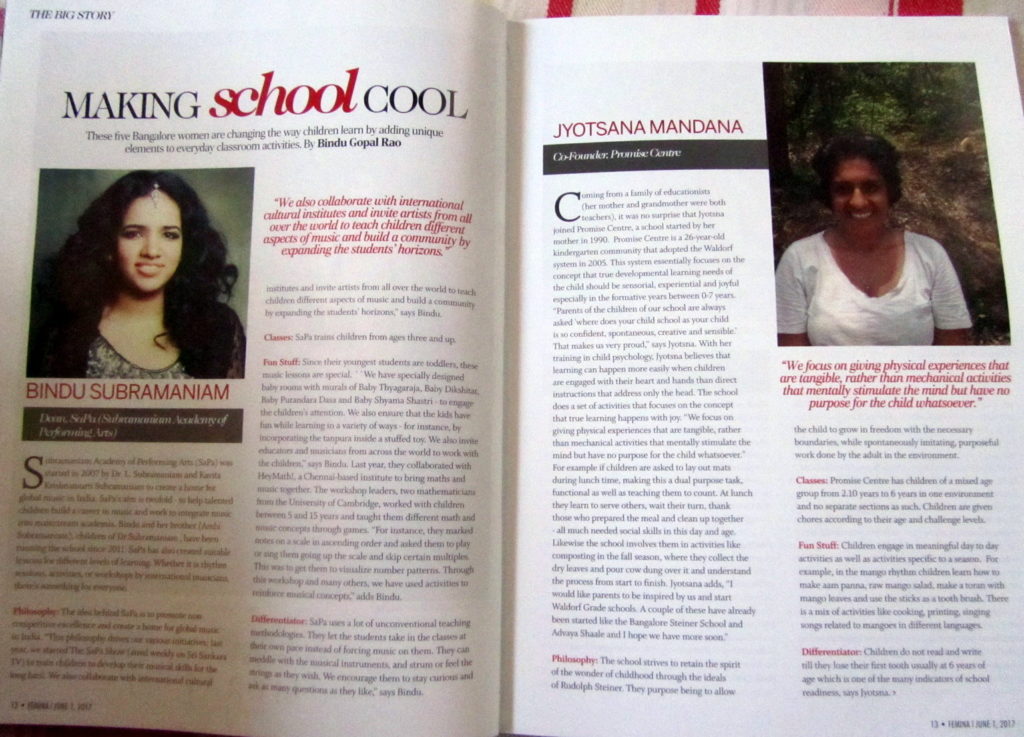
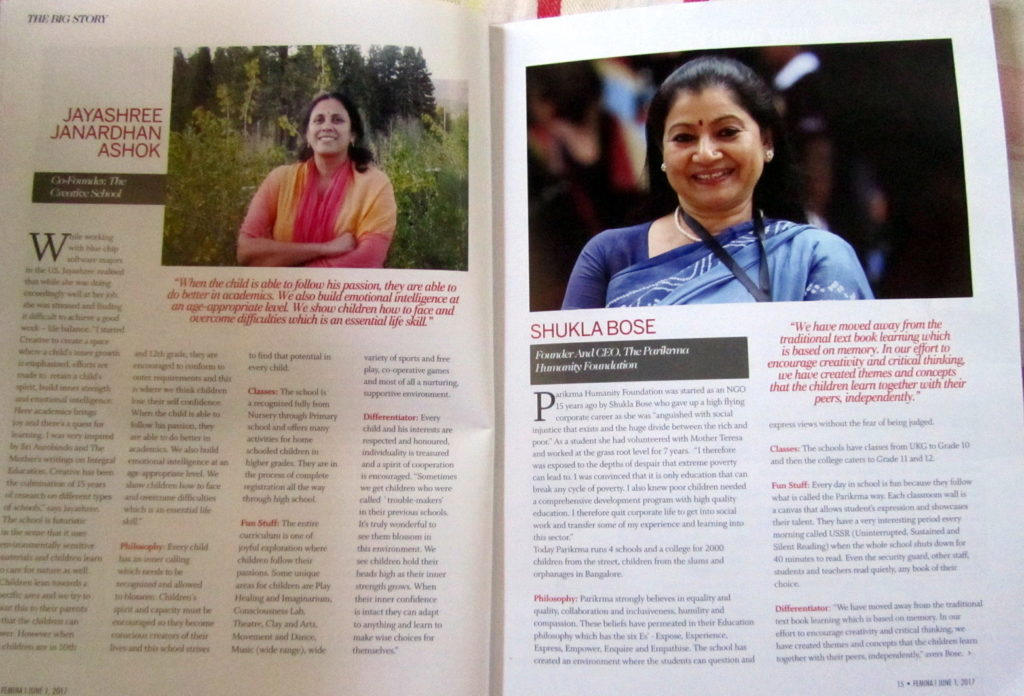
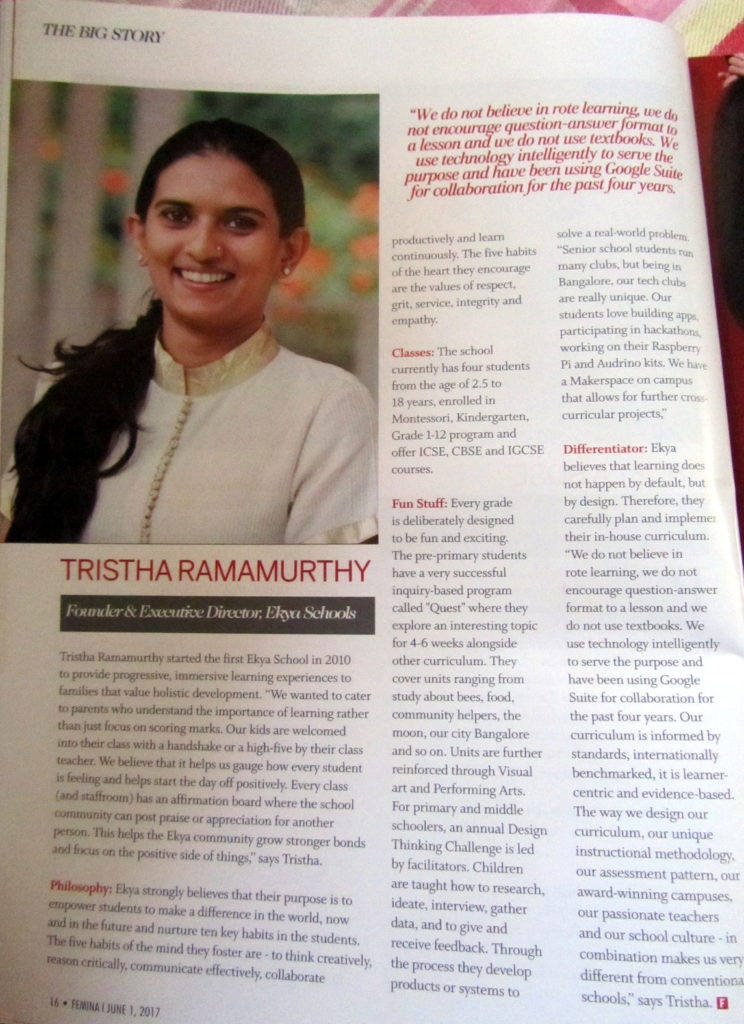
Congratulations to the writer, Shruti Shibulal, Femina Karnataka and to each of the power-women in the education space listed here. What a wondrous way to live your life! So happy to know of the wonderful wonder-women in my city! May their tribe grow! Bangalore is blessed! India is blessed! Much gratitude to each of you and your service to the world! And Jayashree, we love you ?!
Oops! Is the writer, Bindu Gopal Rao? Bindu, heartiest congratulations! Beautifully portrayed stories here!
Thanks Veda 🙂
Lovely to also see Bindu’s SaPa! Novel idea! Wish I could go back in time to fulfill my dreams of surrendering my life music!
Remember Bindu and her siblings at Valley when I used to teach there and Bindu studied with my son, Kartik! Good to see all of you doing so well. Glad that you’re carrying the bastion of music and learning! Pranaam to your wonderful parents ???